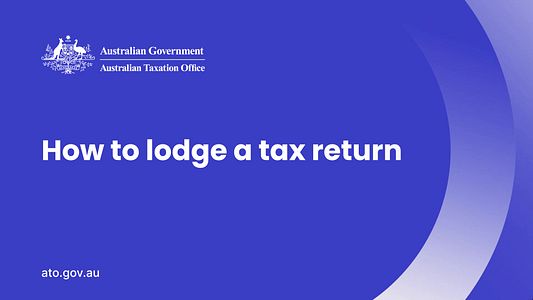Get Your Tax Return Filed Faster with These Online Services in Australia
Get Your Tax Return Filed Faster with These Online Services in Australia
Blog Article
Usings a Tax Return: Unlocking Possible Financial Savings and Guaranteeing a Larger Tax Obligation Reimbursement
The tax return serves as an essential instrument for individuals looking for to optimize their economic outcomes, offering many methods for potential savings and boosted refunds. The intricacies of tax obligation policies and the ever-evolving landscape of tax obligation legislation demand a thorough understanding of available options.
Comprehending Tax Obligation Reductions
Several taxpayers might locate themselves bewildered by the complexities of tax reductions, yet recognizing these vital elements is important for making best use of potential financial savings. Tax obligation deductions minimize taxable earnings, thereby reducing the total tax obligation responsibility for individuals and companies. Acquainting oneself with the different sorts of deductions offered can significantly improve one's ability to enhance income tax return.
Reductions can be categorized into itemized and basic deductions. The conventional deduction supplies a set decrease in taxable earnings, while itemized reductions allow taxpayers to identify particular expenses, such as home loan rate of interest, state tax obligations, and charitable payments. Taxpayers should evaluate which option produces the biggest advantage, as selecting the ideal deduction technique can bring about considerable financial savings.
In addition, it is essential to maintain precise documents of insurance deductible costs throughout the tax year. This practice not only facilitates the preparation of income tax return yet additionally assures conformity with IRS requirements. Taxpayers need to also stay notified concerning changes in tax laws that might influence qualified reductions, as these can vary yearly. By successfully going across the landscape of tax deductions, individuals can reveal the capacity for a much more desirable tax obligation end result and secure greater financial advantages.
Discovering Tax Obligation Credit Scores
Tax obligation credits stand for one more noteworthy avenue for taxpayers to reduce their overall tax obligation liability, enhancing the advantages acquired from reductions. Unlike deductions, which lower taxed earnings, tax obligation credits give a dollar-for-dollar reduction of the real tax obligation owed. This distinction makes tax credit scores specifically beneficial for individuals looking for to maximize their savings.
There are two major kinds of tax credit histories: nonrefundable and refundable. Nonrefundable credit histories can decrease your tax responsibility to zero but not below that amount, while refundable credit scores can cause a refund if the credit scores exceed the tax obligation owed. Instances of frequently asserted tax obligation credit reports consist of the Earned Income Tax Obligation Credit Rating (EITC), the Youngster Tax Obligation Credit report, and education-related credit scores like the American Chance Credit Scores.
Qualification needs for these credit ratings can differ substantially, often based on earnings, submitting standing, and certain circumstances. Taxpayers must completely examine the criteria related to each credit rating to determine they claim all advantages for which they certify. By purposefully utilizing available tax obligation credit ratings, individuals can improve their income tax return, ultimately leading to substantial savings and possibly larger reimbursements.

Spending Your Refund Intelligently
Receiving a Tax reimbursement can really feel like a financial windfall, however exactly how that cash is utilized can profoundly influence lasting monetary wellness. Rather than seeing your reimbursement as non reusable income, consider it a possibility to purchase your future.

One efficient choice is adding to a Specific Retirement Account (IRA) This can enhance your retired life cost savings while possibly generating tax obligation benefits. Investing in a diversified supply portfolio can provide substantial growth capacity over time, permitting your refund to work for you in the market.
In addition, take into consideration using your refund to pay down high-interest financial debt, such as charge card balances. Minimizing debt can boost your economic standing and alleviate stress and anxiety, ultimately enabling you to allot even more funds towards investments in the future.
For those focused on education, utilizing your refund for a 529 college cost savings plan can assist safeguard a brighter future for yourself or your children.
Planning for Future Expenditures
Thoroughly preparing for future costs is necessary for maintaining financial stability and achieving lasting goals. A well-structured financial strategy enables people to allot sources properly, making certain that upcoming costs do not disrupt their financial well-being. Tax returns can offer an important foundation for this preparation process.
Using the reimbursement as a springboard, individuals can identify and focus Home Page on substantial future costs, such as home repair work, education costs, or medical care requirements. Developing a budget plan that incorporates these prepared for costs enables a proactive strategy, reducing the probability of financial pressure when the time involves resolve them.
Furthermore, alloting funds from your tax obligation reimbursement right into dedicated interest-bearing accounts can boost the effectiveness of your preparation. Australian Tax return online. Think about creating an emergency fund especially for unexpected expenses, making sure that you are prepared for unpredicted situations without derailing your monetary objectives
Common Blunders to Prevent
When managing their tax obligation returns that can threaten their economic preparation initiatives,Several people make essential errors. One usual mistake is failing to keep exact documents. Inadequate documentation can bring about missed deductions, leading to a reduced refund or higher tax responsibility. It is vital to keep arranged records of all earnings, expenditures, and tax-related records throughout the year.
Another frequent mistake is neglecting to examine tax obligation regulation adjustments. Tax obligation regulations can develop every year, and lack of knowledge of these modifications might result in missed out on possibilities for tax credit ratings or reductions. Furthermore, numerous taxpayers ignore eligible deductions, such as those for educational costs or medical expenditures.

Declaring taxes prematurely or far too late can likewise be damaging. Early filers may lose out on final tax obligation breaks, while late filers risk fines and interest.
Furthermore, not looking for expert assistance when required can cause Get the facts pricey mistakes. Tax professionals can offer valuable insights, ensuring compliance and maximizing potential cost savings.
Last but not least, rushing through the return can result in straightforward math my blog blunders or overlooked types. Making the effort to verify all entrances is crucial for an effective income tax return result.
Final Thought
To sum up, the tactical usage of tax returns works as a critical device for making the most of financial advantages. By extensively recognizing and using credit histories and deductions, people can considerably minimize gross income and improve refund quantities. Furthermore, prudent financial investment of refunds and effective preparation for future costs add to long-lasting financial security. Understanding of common challenges can also enhance the tax procedure, ultimately empowering taxpayers to utilize their returns for a more safe and secure monetary future.
Tax credit histories stand for an additional noteworthy opportunity for taxpayers to reduce their overall tax obligation liability, matching the advantages obtained from deductions. Unlike reductions, which reduced taxed earnings, tax credit scores give a dollar-for-dollar reduction of the real tax owed. Nonrefundable credit scores can decrease your tax obligation liability to zero but not below that amount, while refundable debts can result in a refund if the credit scores exceed the tax owed. Instances of commonly claimed tax credits consist of the Earned Revenue Tax Obligation Credit Score (EITC), the Youngster Tax Obligation Credit score, and education-related credit histories like the American Possibility Debt.
Tax obligation guidelines can advance each year, and lack of knowledge of these modifications may result in missed out on possibilities for tax credit scores or deductions. - Australian Tax return online
Report this page